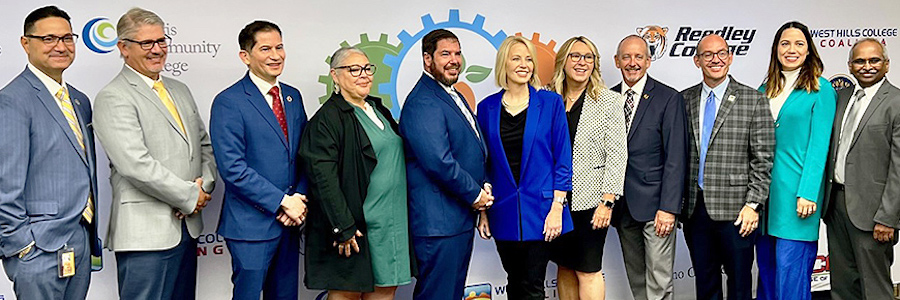A bold new initiative offers the opportunity to better-shape and position agriculture in California’s Central Valley, the nation’s food and farming bread-basket, for a challenging but promising future.
In September, the Biden Administration awarded $65.1 million – the largest federal grant ever awarded to the Central Valley – to the Fresno- Merced Future of Food (F3) Coalition.
The coalition plans to use the funding to help launch a new, state-of-the-art agricultural technology hub that will serve and connect farmers across the Central Valley to industry. Its mission, according to the University of California, Merced, is to “spark a new, more advanced era in agriculture-based technology in an effort to boost productivity, create jobs and build capacity for regional sustainability.”
The F3 coalition is composed of scholars and researchers from UC Merced and Fresno State University, along with farmers, agricultural organizations, valley community colleges and food manufacturers. The Central Valley Community Foundation, led by Ashley Swearington, is the coordinator of the grant and the lead agency for the F3 coalition.
“This is an unprecedented level of investment for the central San Joaquin Valley,” Swearington, president and CEO of the Central Valley Community Foundation and former Mayor of Fresno, said in announcing the grant and the opportunities it offers agriculture in the Central Valley.
“The fact that the region that feeds the nation is now the nation’s priority is a huge win for people who have been working for decades to grow small businesses, to connect farm workers with opportunities to move into higher paying jobs, and to train scientists of today and tomorrow to create the technology we need to grow food sustainably,” Swearington added. “This is everything coming together at once to benefit the people and places of the Central Valley.”
A major aspect of the initiative is the creation of a new Agri-food technology center, called iCREATE, on the Merced College campus, in Merced, California.
In addition to funding from the federal government grant, Merced College is receiving $15 million from the state of California to help build the facility, which is in addition to $30 million it received in 2021.
The college will be the focus of a regional Agri-food Technology and Engineering Collaborative, or AgTEC, tasked with developing classes and programs, along with partner-colleges Fresno City College, Reedley College, Clovis Community College, Madera Community College, College of the Sequoias, and West Hills College campuses in Coalinga and Lemoore.
Scholars and researchers from UC Merced and Fresno State, which has one of the premier agriculture educational and research programs in the nation, will be involved too as partners in the broad-based coalition. Their main focus will be on developing and testing new ideas and concepts for the future of food and farming in the Central Valley.
As part of the practical mission of AgTEC, the 8 community colleges, which comprise five counties in the Central Valley, will also be involved in providing job skills training and certification for farm workers and food industry workers.
The training will be geared toward low-skill, low-wage workers whose jobs are most likely to be displaced by automation, helping them gain the knowledge and skills they need for more advanced jobs in agriculture or food-related manufacturing. Numerous farmers and food manufacturing companies have signed on to this advanced skills training initiative as supporters and partners. Merced College says the goal is to train at least 8,400 workers over the duration of the program.
This major, integrated new initiative and funding is the biggest thing that’s happened to food and farming in the Central Valley in many decades. It’s big and it’s bold, which is appropriate for the largest agricultural region in the nation.

The initiative’s timing too is vital because farming in the Central Valley is facing a series of unprecedented challenges, including drought and irrigation water shortages, increasing labor costs and shortages, supply chain problems, and the longer-term challenge of climate change. All these issues and more need to be addressed by the initiative.
The recognition by the federal government and the state in the form of the multi-million dollar funding is key as well because the Central Valley is the vital region in terms of producing food for the nation and much of the world. As such, the challenges above must be addressed from both a research standpoint – new ideas, concepts and innovations – and in a practical way – additional training and the implementation of technology on the farm.
Farming’s sister industry, food processing and manufacturing, also is strained in the Central Valley by similar challenges – water, labor, supply chain issues, rising costs across the board and more.
It’s vital the two industries cooperate in the initiative because over the years the Central Valley has lost many food processing plants because of these challenges. Having a vibrant agri-food industry in the valley is important because, among other things, it shortens the supply chain, which benefits both farmers and food-makers from the standpoint of cost-efficiency and the creation of a true value-chain from the farm to the manufacturing plant.
Among the benefits I hope to see come from the initiative include the integration of new technologies on the farm – particularly in the areas of water conservation and sustainability – improving farm productivity, the creation of much-needed better-paying jobs in the Central Valley and better integration between farming and the related food processing industry in the valley. The latter is a natural for the region and can provide numerous benefits to both farmers and food manufacturers, as well as ultimately to consumers.
Initiatives like this one offer a much brighter future for food and farming in the Central Valley.
My Job Depends on Ag Magazine columnist and contributing editor Victor Martino is an agrifood industry consultant, entrepreneur and writer. One of his passions and current projects is working with farmers who want to develop their own branded food products. You can contact him at: victormartino415@gmail.com.







